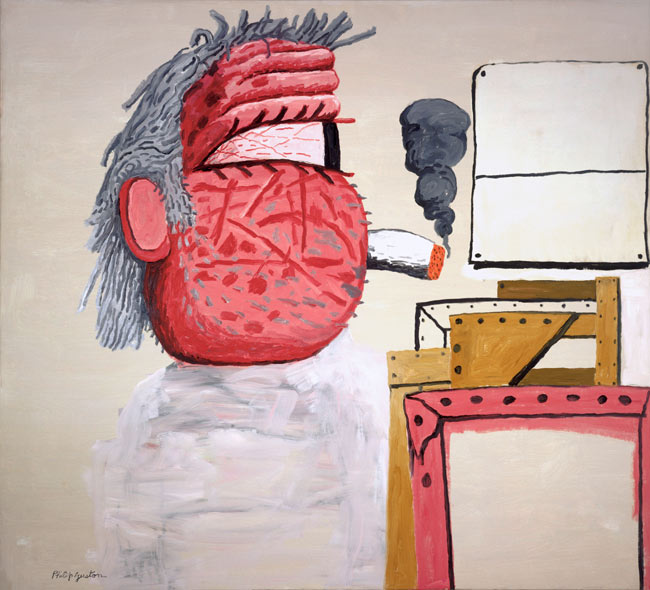
Everyone knows I am a Philip Guston nut. It is a mystery to me why everyone else is not. I have a lot of Guston books, monographs and art books from shows and retrospectives, Guston’s “Collected Writings,” his daughter’s book, “Night Studio, Ross Feld’s book about his relationship with Guston. They are all good but seeing Guston’s images in person is a sensation, a three dimensional, physical sensation. He is quoted as saying he would like to draw like the cavemen, the first people to ever attempt to draw something, when nothing is known and there are no clichés. He says his own paintings “baffle me, too. That’s all I’m painting for.” The following is from a lecture at the University of Minnesota in 1978. It really knocks me out.
“Regarding the general situation in art today, which I suppose is the subject of this conference, I haven’t really too much to say. It has become official, obviously; it is so insured against failure, against bad painting, against risking. But something must be wrong somewhere, because there is this overwhelming success and at the same time such an overwhelming apathy. Everyone knows about art, except the artist. He, it seems, must find out not about art, but how to stay on the treadmill. Each time he paints he must discover how to trust himself, his instincts without knowing how it will turn out. It sounds easy until you try it.
I think it was Picasso who was interviewed and who was asked “What has been the most important thing in your life, master?” and he replied, “self‐trust.” He said that it had taken him a life time to learn how to trust his inchoate urges and instincts. And it’s not easy to achieve because we don’t even recognize the extent to which we are victims of the institutionalized art which is all around us. Nor how often we check ourselves. You have a feeling or thought‐check, check, check. Of the two writers that I’ve admired the most for years, Franz Kafka and Isaac Babel, Isaac Babel gave a lovely, ironic speech to the Soviet Writers’ Union. It was 1934. He ended his talk with the following remark: “The party and the government have given us everything, but have deprived us of one privilege. A very important privilege, comrades, has been taken away from you. That of writing badly.” Isn’t that beautiful? Where am I? Doesn’t anyone want to paint badly?”
more excerpts from this talk
3 Comments
I can’t speak about painting but you cannot write well without writing badly. I had to learn this to finish the first draft of my first novel. If you keep trying to be good it doesn’t get done and it will be stilted. You can’t even fix it until you see what the story is actually about. I doubt it is any different in any medium. I know that when we would start on a new song it would always be pretty bad until each person started honing in on each other’s parts to make a whole.
painting, writing, music, same
https://www.youtube.com/watch?v=zQxJxWnoFG4
Guston is the pistachio of my eye. Have always enjoyed his searching mind and brush. Your post is a nod to the show, Bad Painting, curated by Marcia Tucker in 1978 at the New Museum in NYC: http://archive.newmuseum.org/index.php/Detail/Occurrence/Show/occurrence_id/5Since then bad painting has become stylish, the rigor of the day. Look around, it’s everywhere. The new rigor might well be reflection, think more and do less. Whereas thinking can be considered both passive and active, for the moment, I prefer to emphasize the passive. I don’t think, by in large, we savor the ‘not doing,’ the naughtiest of ‘bad’ in our culture. My last performance piece was titled, “Staring Out the Window.” Great post Paul!